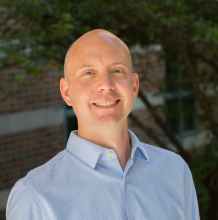CBE Seminar (Zoom): Single-Molecule Electronics - Understanding Charge Transport in Sequence-defined Materials using Automated Chemical Synthesis

James Economy Professor, Materials Science and Engineering Department
Chemical and Biomolecular Engineering Department
University of Illinois at Urbana-Champaign
Registration link for non-UCI people: https://forms.gle/Swey2oKgas8TqTMGA
Abstract: Continuing worldwide demand for high-performance electronic devices is driving the need for single-molecule electronics, which offers the promise of increased computing power via small feature sizes. To develop new materials for advanced computing applications and energy storage, we require a fundamental understanding of molecular-scale charge transport. Despite recent advances, progress in single-molecule electronics has been hindered by challenges in precisely quantifying molecular electronic properties, coupled with an inability to explore the vast chemical sequence space available for organic materials. Our work focuses on understanding charge transport at the single-molecule level for new classes of organic materials using automated chemical synthesis. In this talk, I will discuss our recent work in characterizing molecular charge transport using a scanning tunneling microscope-break junction (STM-BJ) instrument, which enables reliable measurements of molecular conductance as a function of applied bias and solution environments. Using this approach, we study charge transport in several molecular systems, including: (1) conjugated molecular wires that undergo a switch between nonresonant and resonant transport as a function of applied bias, and (2) sequence-defined oligomers prepared using automated chemical synthesis. We recently designed and built an automated chemical synthesis instrument capable of generating precisely defined synthetic molecules, oligomers and polymers. Using this approach, large molecular libraries are synthesized using iterative deprotection / Suzuki coupling chemistry and directly characterized using single molecule methods. Interestingly, our results show that precise control of molecular sequence reveals unexpected charge transport behavior for conjugated organics, including the formation of multiple conductance pathways via internal molecule-electrode linkages and enhanced transport due to molecular conformational changes induced by chemical side chains. These results provide new molecular design rules for creating functional electronic devices based on molecular building blocks. Overall, our results highlight the use of single molecule techniques to enable the discovery of new materials for molecular electronics applications.
Bio: Charles Schroeder is the James Economy Professor of materials science and engineering and professor of chemical and biomolecular engineering at the University of Illinois at Urbana-Champaign. He serves as co-chair of the molecular science and engineering theme in the Beckman Institute for Advanced Science and Technology. Schroeder is a faculty member in the Center for Biophysics and Quantitative Biology and holds affiliate status in the Department of Chemistry, the Department of Bioengineering, the Carl R. Woese Institute for Genomic Biology and the Materials Research Lab (MRL). He received his bachelor's degree in chemical engineering from Carnegie Mellon University in 1999, followed by an master's degree in 2001 and doctorate in 2005 in chemical engineering from Stanford University under the supervision of Professors Eric Shaqfeh and Steve Chu. Before joining the University of Illinois in 2008, he was a Jane Coffin Childs Postdoctoral Fellow in the Department of Chemistry and Chemical Biology at Harvard University and the Department of Chemical Engineering at UC Berkeley. Schroeder has been the recipient of several awards, including a Packard Fellowship for Science and Engineering, a Camille Dreyfus Teacher-Scholar Award, an NSF CAREER Award, the Publication Award from the Society of Rheology, the Arthur B. Metzner Award from the Society of Rheology, an NIH Pathway to Independence Award (K99/R00), and the Dean’s Award for Excellence in Research at Illinois.
Share
Upcoming Events
-
EECS Seminar: Steering Diffusion Models for Generative AI, From Multimodal Priors to Test-Time Scaling
-
MAE 298 SEMINAR: Hypersonic Viscous Aerothermochemistry - External Aerothermodynamics and Scramjet Fuel-Air Mixing
-
CBE 298 Seminar: Finding Catalysts of Gut Reactions - The Gut Microbiota in Disease Onset and Treatment
-
CEE Seminar: Confirming a Critical Foundation of Global Warming - Direct Observational Evidence from Space of the Impact of CO2 Growth on Infrared Spectra
-
CBE 298 Seminar: Teaching Transport Phenomena Through Observation - From Einstein’s Tea Leaves to Dissolving Skittles
